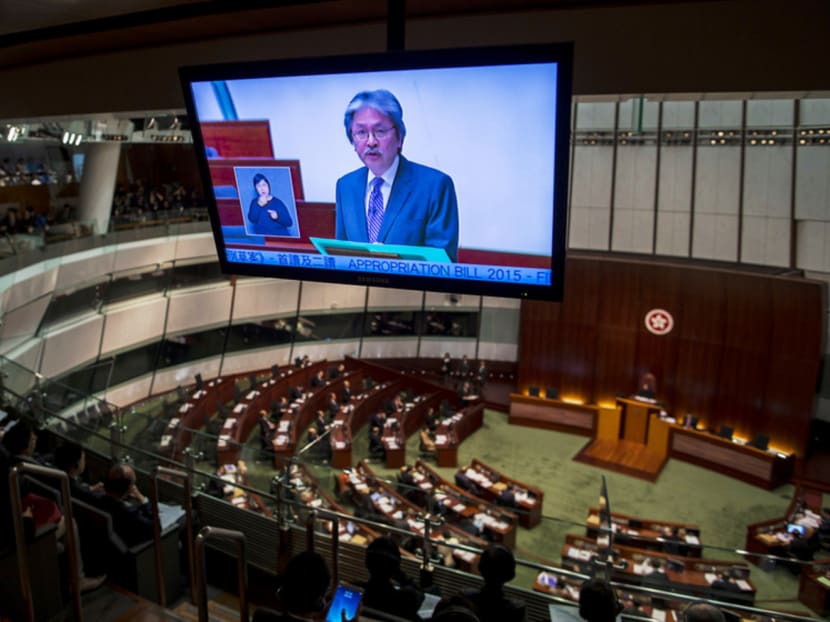HK budget to help lower, middle classes
HONG KONG — The Hong Kong government announced yesterday an annual budget full of tax breaks and other handouts to provide economic support to the lower and middle classes, as well as businesses that it said had been disrupted by 11 weeks of street demonstrations about two months ago.

Financial Secretary John Tsang delivering his annual budget report at the Legislative Council in Hong Kong yesterday. PHOTO: REUTERS
HONG KONG — The Hong Kong government announced yesterday an annual budget full of tax breaks and other handouts to provide economic support to the lower and middle classes, as well as businesses that it said had been disrupted by 11 weeks of street demonstrations about two months ago.
Although outlays for social welfare and education are set to rise, a major target of government spending in the coming year will be large-scale infrastructure projects — expenditures that often benefit the wealthy elite, who control the city’s property developers and construction companies.
Hong Kong is spending billions on several mega projects that have been subject to significant delays and cost overruns. These include nearly HK$77.6 billion (S$13.6 billion) on a 50km bridge and tunnel to the cities of Macau and Zhuhai; HK$46.5 billion on a new cluster of theatres and arts venues; HK$70 billion on a high-speed rail link to Guangzhou; and HK$108.5 billion on local subway system extensions.
In his budget speech yesterday, Financial Secretary John Tsang said work on a third runway for the Hong Kong International Airport, estimated in 2011 to cost at least HK$140 billion, could begin next year and be completed by 2023.
The risk to these projects and other large government spending programmes, such as fiscal initiatives to help a rapidly ageing population, is that public opposition after the Occupy Central protests could leave the government hamstrung.
“Is the government still going to have the basic consent of the population to draw up and implement economic policies — tackling the ageing issue or getting infrastructure done, for example?” said Mr Andrew Colquhoun, head of Asia-Pacific sovereign ratings at Fitch Ratings in Hong Kong. “That’s still an open question, whether that political constraint becomes more binding for them.”
Hong Kong’s widening wealth gap and increasingly unaffordable housing emerged as catalysts for last year’s democracy protests, as hundreds of thousands of people blockaded major roads for 79 days to protest Beijing’s curbs on the planned inaugural vote in 2017 for the city’s top leader.
Mr Tsang yesterday offered several measures intended to help address the widening wealth gap. He announced one-time items that included tax breaks on salaries and profits; increased funding for small and medium enterprises; increased welfare payments for the poor and elderly; and a one-month rent waiver for low-income tenants of public housing.
He also increased the permitted tax deduction for raising children, a recurrent measure and estimated the cost of all handouts at HK$34 billion.
Mr Tsang also announced measures worth HK$290 million he said were intended to help the city recover from the effects of the Occupy protests.
There is little doubt Hong Kong’s government can afford the largesse. Mr Tsang estimated the budget surplus for the year that ends on March 31 at HK$64 billion dollars, up from his estimate of HK$9 billion a year ago.
Repeated larger-than-anticipated surpluses have left the government with an embarrassment of riches. Fiscal reserves are now forecast to rise to HK$856 billion dollars by the end of March next year, equal to 37 per cent of gross domestic product. The reserves could cover 23 months’ worth of government expenditures.
The economy grew 2.3 per cent last year, compared with 2013, in line with forecasts. The government expects growth of 1 to 3 per cent this year, Mr Tsang said. THE NEW YORK TIMEs





